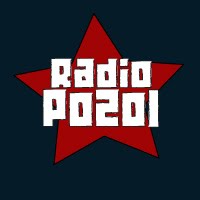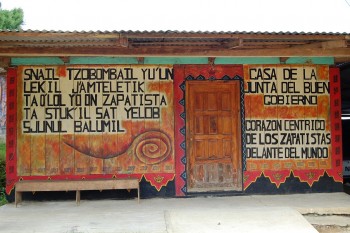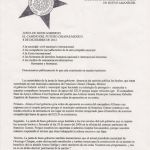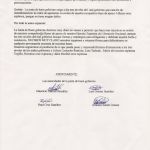
JBG
(Español) La longue histoire de violence paramilitaire et d’impunité de l’ORCAO
15 septembre 2021
Samedi dernier, le 11 septembre 2021, comme le dénonce le Réseau Ajmaq, deux membres du Conseil de bon gouvernement « Patria Nueva », du Caracol 10 (Ocosingo), ont été séquestrés par l’Organisation régionale des caféiculteurs d’Ocosingo (ORCAO). À ce jour, les autorités zapatistes, José Antonio Sánchez Juárez et Sebastián Núñez Pérez, sont portés disparus. Du Collectif Radio zapatiste, nous lançons un appel à la solidarité nationale et internationale pour exiger leur libération immédiate.
L’ORCAO, dénoncée de manière répétée par les Conseil de bon gouvernement comme étant une organisation paramilitaire, agresse les communautés zapatistes depuis plus de 20 ans avec une violence croissante et en totale impunité.
L’ORCAO a été fondée en 1988 par 12 communautés de la municipalité d’Ocosingo, au Chiapas, comme une organisation de lutte légitime qui revendiquait de meilleurs prix pour le café et une solution aux conditions rudimentaires de l’agriculture. En peu de temps, de nombreuses communautés supplémentaires l’ont rejointe. Pendant des années, l’ORCAO a entretenu des liens avec le zapatisme. Pourtant, ces derniers ont été rompus quand, à la fin des années 90, l’organisation, comme tant d’autres, a cédé à la tentation de négocier des aides gouvernementales et des postes publics en échanges de faveurs.
La rupture s’est agravée avec l’arrivée de Pablo Salazar au poste de gouverneur du Chiapas en 2000. L’ORCAO a alors abandonné la lutte et s’est alliée avec le gouvernement, rompant avec l’EZLN pour avoir accès à l’argent public.
À partir de ce moment, les agressions sont devenues de plus en plus fréquentes et violentes.
Nous faisons ici un résumé de ce qui a marqué la trajectoire de violence de cette organisation depuis cette époque.
En juin 2002, environ 70 membres de l’ORCAO ont attaqué avec des pierres, des gourdins, des fusils, des chaînes et des machettes des bases d’appui zapatistes à Nuevo Poblado Javier López, municipialité autonome de Francisco Gómez, avec la complicité et le soutien de la police.
En juin 2002, des membres de l’ORCAO de Sibacá ont détruit deux hectares de culture de la municipalité autonome Primero de Enero, en plus de démolir des clôtures à Pomalá, de menacer les habitants de López-Chamizal, d’expulser des zapatistes de Ucumiljá y Ja’ten’chib (Ocosingo) et de les forcer à quitter leurs maisons à coups de feu à San Pedro Buena Vista (Sitalá), les dépouillant ainsi de 30 hectares de terres et leur volant leurs maisons et leurs biens.
En janvier 2009, alors que l’EZLN célébrait le Festival de la digne rage à San Cristóbal de Las Casas, des membres de l’ORCAO ont attaqué et essayé de prendre à des bases d’appui zapatistes, un terrain de 500 hectares à Bosque Bonito, municipalité autonome Che Guevara. Peu après, 220 personnes de l’ORCAO, à bord de 19 camions et camionnettes, ont essayé de pénétrer de force dans le caracol de Morelia. A peu près aux mêmes dates, l’ORCAO a aussi bloqué aussi le passage à des zapatistes qui transportaient du bois pour la construction de nouveaux espaces pour l’école autonome de Primero de Enero.
En avril de la même année, pendant que la police de secteur et le groupe paramilitaire OPDDIC attaquaient et harcelaient les zapatistes autour des cascades d’Agua Azul, des membres de l’ORCAO menaçaient de mort les zapatistes, essayaient de brûler le magasin collectif du carrefour de Cuxuljá (acte effectué en août 2020) et incendiaient 60 hectares.
A la fin de cette année, les Conseils de bon gouvernement de La Garrucha et de Morelia ont dénoncé le fait que l’ORCAO avait organisé un groupe pour se rendre maître du marché paysan d’Ocosingo, en expulsant les zapatistes.
En juillet 2011, des membres de l’ORCAO ont envahi des terres récupérées par l’EZLN dans la localité d’El Paraíso, et ce, après diverses attaques antérieures, entre mars et juin 2011, au cours desquelles ils ont détruit 4500 plants de café, un demi-hectare de canne à sucre et un demi-hectare de maïs, en plus d’avoir volé du bétail, du fil de fer, et d’avoir coupé du bois. En juin de cette même année, des membres de la ORCAO ont séquestré et torturé deux zapatistes à Ocosingo.
En août 2011, des paramilitaires de l’ORCAO ont détruit une maison destinée aux observateurs dans la communauté de l’Ejido Patria Nueva, qui appartenait alors au caracol de Morelia. Ce même mois, 12 groupes armés de la ORCAO ont agressé des bases d’appui zapatistes avec des armes à feu, des pierres et des bâtons.
En mai 2012, la JBG de Morelia a dénoncé des confiscations de terres par l’ORCAO dans les municipalités autonomes du 17 Novembre et de Lucio Cabañas. En août de la même année, l’ORCAO a réalisé plusieurs attaques armées contre des bases d’appui zapatistes, selon la JBG de Morelia.
En juillet et en août 2014, des membres de l’ORCAO ont mené une série d’attaques et ont expulsé des bases d’appui zapatistes de la municipalité autonome de San Manuel, caracol de La Garrucha, juste avant que ne se réalise le partage entre peuples originels du pays au caracol de la Realidad, en août de cette année. (voir Action urgente du Frayba.)
Le 23 février 2020, des membres du Congrès national indigène (CNI) des communautés de San Antonio Bulujib y Guaquitepec, de la municipalité de Chilón, y compris deux bébés, ont été frappés et séquestrés par des membres de l’ORCAO et du groupe paramilitaire Los Chinchulines, ainsi que des membres du parti MORENA, en représailles pour avoir participé aux Journées en défense du territoire et de la Terre Mère ” Nous sommes tous et toutes Samir” (voir dénonciation du CNI).
Le 22 août 2020, des membres de l’ORCAO ont saccagé et incendié deux entrepôts de maïs et de café appartenant à des bases d’appui zapatistes, au carrefour de Cuxuljá, entre Oxchuc y Ocosingo, dans la municipalité autonome de Lucio Cabañas, ce qui a déchenché une forte condamnation nationale et internationale.
(Voir le rapport de la Caravane solidaire des communautés zapatistes de Moisés Gandhi et de Nuevo San Gregorio. Voir aussi ce reportage de Avispa Mídia et cet autre en Pie de Página).
Le 8 novembre de cette même année, l’ORCAO a séquestré et torturé le base d’appui zapatiste Félix López Hernández, libéré grâce à la pression nationale et internationale quelques jours plus tard. Dans la même dénonciation, la JBG de Patria Nueva affirme que l’ORCAO a reçu des aides du gouvernement pour construire une école, mais qu’elle les a utilisées pour acheter des armes de gros calibre, avec la probable complicité du gouvernement de la 4T.
En janvier 2021, le Centre de droits humains Fray Bartolomé de Las Casas rapportait de nouvelles agressions armées de l’ORCAO à l’encontre de la communauté Moisés Gandhi. En avril de cette même année, alors qu’ils se rendaient à une réunion à Palenque, deux membres de ce Centre de droits humains ont été séquestrés dans le village de San Felipe, habité en majorité par des membres de l’ORCAO, ce qui fait que tout indique que c’était un acte en représailles du travail de documentation du Centre de ce Centre.
Ce n’est pas un hasard que la séquestration des deux membres du Conseil de bon gouvernement du Caracol 10 Patria Nueva se fasse dans le contexte de la Traversée pour la Vie, juste au moment où la délégation aérienne zapatiste arrive à Vienne pour commencer une série de réunions avec des collectifs et des organisations de gauche sur le territoire européen. Face à la lutte pour la vie, la violence paramilitaire impunie est incitée par le gouvernement de la soi-disant Quatrième Transformation.
Nous nous joignons à l’exigeance de la libération immédiate de José Antonio Sánchez Juárez et de Sebastián Núñez Pérez, et de la fin des agressions et de l’impunité dont jouit l’Organisation régionale des caféiculteurs d’Ocosingo (ORCAO).
The Long History of ORCAO Paramilitary Violence and Impunity in Chiapas
(En français ici | Español aquí)
On September 11 of this year, two Zapatistas from the Good Government Council Patria Nueva of Caracol 10, Ocosingo, were kidnapped by ORCAO. After widespread mobilizations and denunciations, along with the intervention of religious authorities, they were released on September 19.
ORCAO has been denounced repeatedly by the Zapatista Good Government Councils as a paramilitary organization, which has constantly for more than 20 years threatened and harassed Zapatista communities with growing intensity and complete impunity.
The Regional Organization of Coffee Growers of Ocosingo (ORCAO) was founded in 1988 by 12 communities in the municipality of Ocosingo, Chiapas, as an organization of legitimate struggle demanding better coffee prices and a solution to agrarian backlog. In little time, many more communities joined the organization. For years, ORCAO maintained connections with Zapatismo. However, those connections were broken in the late 1990’s when the organization, like many others, caved to the temptation of government support and political positions in exchange for favors. The rupture worsened in the year 2000 with the arrival of Pablo Salazar as governor of Chiapas. ORCAO abandoned the struggle and allied with the government, breaking with the EZLN in order to gain access to state funds. From that moment on, the aggressions have become increasingly frequent and violent.
Here is a summary of the trajectory of violence carried out by the paramilitary organization:
In January 2002, around 70 members of ORCAO, armed with rocks, clubs, chains, and machetes, attacked Zapatista Support Bases in Nuevo Poblado Javier López, in the autonomous municipality of Francisco Gómez, with the complicity and support of the police.
In June 2002, members of ORCAO of Silbacá destroyed two hectares of crops in the autonomous municipality of Primero de Enero. Furthermore they demolished the territorial limits of Pomalá, threatened inhabitants of López-Chamizal, expelled Zapatistas from Ucumiljá and Ja’ten’chib (Ocosingo) and dispossessed them of 30 hectares of land, while robbing their houses and all their belongings.
In January 2009, while the EZLN celebrated the Festival of Dignified Rage in San Cristóbal de Las Casas, members of ORCAO attacked and tried to dispossess Zapatista Support Bases of 500 hectares in Bosque Bonito, in the autonomous municipality of Che Guevara. A little while afterwards, 220 members of ORCAO aboard 19 trucks and vans tried to forcibly enter the Caracol of Morelia. Around that time, ORCAO also impeded the passage of Zapatistas who were transporting wood for the construction of new spaces of the autonomous school of Primero de Enero.
In April of that same year, while police and the paramilitary group OPDDIC attacked and harassed Zapatistas around the waterfalls of Agua Azul, members of ORCAO threatened Zapatistas with death, seeking to burn the collective store in Cuxuljá (an act they accomplished in August of 2020) and setting fire to 60 hectares.
At the end of that year, the Good Government Councils of La Garrucha and Morelia denounced that ORCAO organized a group to take over the market in Ocosingo, expelling the Zapatistas.
In July of 2011, members of ORCAO invaded lands which had been recuperated by the EZLN in El Paraiso. This followed several previous attacks between March and June of 2011, in which ORCAO destroyed 4500 coffee plants, a half hectare of sugar cane, and a half hectare of corn, in addition to stealing cattle, wire, and wood. In June of that year, members of ORCAO kidnapped and tortured two Zapatistas in Ocosingo.
In August of 2011, ORCAO paramilitaries destroyed a house used by human rights observers in the community Ejido Patria Nueva, then belonging to the Caracol of Morelia. That same month, 12 armed groups of ORCAO attacked Zapatista Support Bases with firearms, sticks, and stones.
In May of 2012, the Good Government Councill of Morelia denounced land dispossession by ORCAO in the autonomous municipalities of 17 de Noviembre and Lucio Cabañas. In August of that same year, ORCAO carried out various armed attacks against Zapatista Support Bases, according to a denouncement made by the Good Government Council of Morelia.
In July and August of 2014, members of ORCAO carried out a series of attacks, displacing Zapatista Support Bases in the autonomous municipality of San Manuel, Caracol of La Garrucha. This took place just before the reunion of Indigenous peoples of the country in the Caracol of La Realidad in August of that same year.
On February 23, 2020, members of the National Indigenous Congress from the communities of San Antonio Bulujib and Guaquitepec, in the municipality of Chilón, were beaten and kidnapped by members of ORCAO and the paramilitary group, Los Chinchulines, as well as members of the MORENA political party. This attack was carried out in retaliation for the communities having participated in the Days in Defense of Territory and Mother Earth “We Are all Samir.”
On August, 2020, members of ORCAO looted and set fire to two corn and coffee warehouses pertaining to the Zapatista Support Bases, in Cuxuljá, between Oxchuc and Ocosingo, in the autonomous municipality of Lucio Cabañas, triggering strong national and international condemnation.
On November 8 of that same year, ORCAO kidnapped and tortured Zapatista Félix López Hernández, who was freed a couple days later thanks to national and international pressure. In the same denunciation, the Good Government Council of Patria Nueva confirmed that ORCAO received government support to construct a school, but that they used it to buy high-caliber weaponry, with the presumed complicity of the government of the Fourth Transformation.
In January of 2021, the Fray Bartolomé de Las Casas Human Rights Center reported new armed aggressions of ORCAO in the community of Moises Gandhi. In April, two members of that human rights center were kidnapped while on their way to a meeting in Palenque, in the community of San Felipe, inhabited in the majority by members of ORCAO, in what all indications was an act of retaliation for the documentation work of the human rights center.
It is not a coincidence that the recent kidnapping of two members of the Good Government Council of Caracol 10 Patria Nueva took place in the context of the Journey for Life, just as the Zapatista air delegation arrived in Vienna to begin a series of encounters with leftist collectives and organizations in the territory known as Europe. In the face of the struggle for life, the response is paramilitary violence promoted by the government of the so-called Fourth Transformation.
Translation: It’s Going Down









